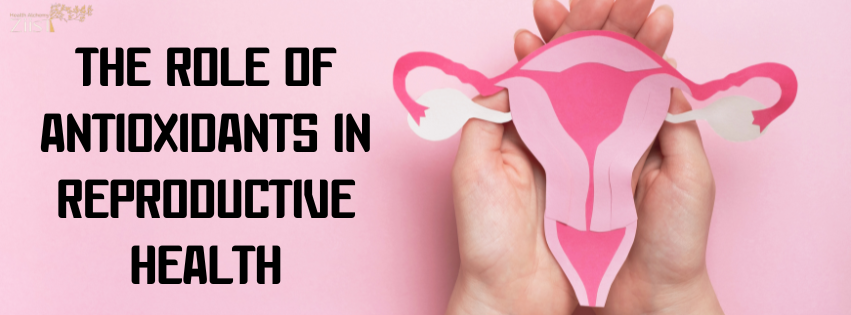The Role of Antioxidants in Reproductive Health
Understanding Oxidative Stress and Its Impact on Reproductive Health
Reproductive health is a delicate system influenced by hormonal regulation, lifestyle choices, age, and environmental factors. However, one of the most overlooked yet significant factors affecting fertility is oxidative stress. This occurs when free radicals (unstable molecules) outnumber antioxidants in the body, leading to cellular damage, inflammation, and compromised reproductive function.
For both men and women, excessive oxidative stress can negatively impact egg and sperm quality, hormone levels, and overall reproductive function. In women, oxidative stress can lead to poor egg maturation, DNA damage in oocytes, implantation failure, and increased miscarriage risk. In men, it is associated with low sperm motility, DNA fragmentation, and decreased sperm count.
With modern lifestyles exposing individuals to pollution, processed foods, chronic stress, and environmental toxins, oxidative stress has become a major fertility challenge. Fortunately, antioxidants offer a powerful natural defense, helping to neutralize free radicals, reduce inflammation, and protect reproductive cells from damage.
The Importance of Antioxidants for Fertility

Antioxidants are essential compounds that help stabilize free radicals and prevent cellular damage. In the context of reproductive health, they are particularly important for:
- Protecting Egg and Sperm DNA: Antioxidants shield reproductive cells from oxidative damage, improving egg and sperm quality.
- Enhancing Ovulation and Embryo Development: Oxidative stress can interfere with ovulation and early embryo development. Antioxidants support healthy follicle growth and implantation.
- Reducing Inflammation in the Reproductive System: Chronic inflammation can impair fertility and increase the risk of miscarriage. Antioxidants combat this by lowering inflammatory markers.
- Improving Insulin Sensitivity in PCOS: Women with PCOS often experience high levels of oxidative stress, leading to hormonal imbalances and ovulatory issues. Antioxidants help regulate insulin and reduce inflammation.
- Supporting Sperm Motility and Function: Antioxidants improve sperm count, motility, and morphology, reducing the chances of DNA fragmentation and male infertility.
Since reproductive cells are highly vulnerable to oxidative damage, supplementing with fertility-enhancing antioxidants can significantly improve conception rates, pregnancy success, and overall reproductive wellness.
Top Antioxidants for Reproductive Health

1. N-Acetylcysteine (NAC): A Powerful Fertility Antioxidant
Why It’s Important: N-Acetylcysteine (NAC) is a precursor to glutathione, the body’s most powerful antioxidant. It plays a critical role in egg and sperm protection, hormonal balance, and detoxification.
How NAC Supports Fertility:
- Protects egg and sperm DNA from oxidative damage
- Supports ovulation and hormonal regulation in PCOS
- Improves insulin sensitivity, reducing metabolic stress
- Enhances embryo quality and implantation success
For those seeking comprehensive reproductive support, Ziist’s NAC with ALA, Magnesium & Selenium is an excellent choice, as it combines NAC with other key fertility-enhancing nutrients.
2. Coenzyme Q10 (CoQ10): Enhancing Egg and Sperm Mitochondrial Function
Why It’s Important: CoQ10 is a crucial mitochondrial antioxidant that supplies energy to eggs and sperm. As reproductive cells require high levels of energy for fertilization and embryo development, CoQ10 plays a major role in reproductive success.
How CoQ10 Supports Fertility:
- Delays ovarian aging and improves egg quality
- Increases sperm motility and reduces DNA fragmentation
- Supports early embryo development in IVF treatments
For women over 35, supplementing with CoQ10 can significantly boost egg viability and fertility potential.
3. Alpha-Lipoic Acid (ALA): A Dual-Action Antioxidant for Hormonal Balance
Why It’s Important: ALA is a fat- and water-soluble antioxidant, making it highly effective at reducing oxidative stress across multiple systems. It plays an essential role in hormonal regulation, insulin sensitivity, and egg health.
How ALA Supports Fertility:
- Improves insulin resistance in women with PCOS
- Protects eggs from oxidative stress and aging
- Enhances embryo implantation success rates
Because ALA works synergistically with NAC, it is a key component in Ziist’s NAC with ALA, Magnesium & Selenium, making it an ideal supplement for female reproductive health.
4. Vitamin C: Supporting Egg and Sperm DNA Integrity
Why It’s Important: Vitamin C is a potent antioxidant that reduces DNA damage in reproductive cells. It also supports progesterone production and healthy cervical mucus, improving implantation chances.
How Vitamin C Supports Fertility:
- Protects eggs and sperm from oxidative stress
- Boosts progesterone levels, supporting embryo implantation
- Enhances male fertility by improving sperm motility and quality
5. Vitamin E: Improving Uterine and Ovarian Health
Why It’s Important: Vitamin E plays a vital role in endometrial health, embryo development, and ovulation. It enhances blood flow to reproductive organs, supporting a healthy uterine lining for implantation.
How Vitamin E Supports Fertility:
- Improves endometrial thickness for better embryo implantation
- Enhances sperm membrane integrity, increasing fertilization success
- Supports ovarian health and hormone production
FAQs
-
How does oxidative stress affect fertility?
Oxidative stress damages reproductive cells, reduces egg and sperm quality, and increases the risk of miscarriage. Antioxidants neutralize free radicals and protect fertility.
-
Can NAC improve fertility in PCOS?
Yes! NAC improves insulin sensitivity, reduces oxidative stress, and supports ovulation in women with PCOS. It also enhances egg quality and reproductive function. Try Ziist’s NAC with ALA, Magnesium & Selenium for optimal PCOS and fertility support.
-
What’s the best antioxidant for egg quality?
CoQ10 and NAC are two of the most powerful antioxidants for egg quality. CoQ10 boosts mitochondrial energy, while NAC protects eggs from oxidative damage.
-
Can antioxidants help male fertility?
Yes! Antioxidants like NAC, CoQ10, and Vitamin C reduce sperm DNA fragmentation, improve motility, and increase sperm count, supporting male fertility and conception success.
-
How long should I take antioxidants before trying to conceive?
It’s best to start 3-6 months before conception, as eggs and sperm take time to mature.
Optimizing Reproductive Health with Antioxidants

Antioxidants play a vital role in fertility, egg and sperm health, and pregnancy success. By incorporating key antioxidants like NAC, CoQ10, and ALA, individuals can significantly improve reproductive outcomes. For those seeking comprehensive fertility support, consider Ziist’s NAC with ALA, Magnesium & Selenium, a powerful blend designed to enhance reproductive function, hormonal balance, and fertility wellness.

